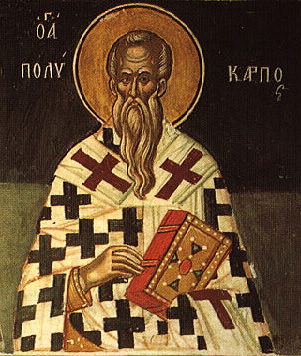
If you really want to know what tradition is look at the life of today's
saint. Saint Polycarp had indirect knowledge of Jesus: he had known those who
had direct knowledge of the Savior. Polycarp was a disciple of the Beloved
Disciple, Saint John the Evangelist, who had converted him around the year AD 80.
And from Saint Irenaeus of Lyons, we learn that Polycarp taught him as a young
man what he learned about Jesus and the Kingdom from the Apostles, which the
Church hands down, which are true. Irenaeus testifies to the seriousness, holiness, and the devotion
Polycarp had for Christ.
The Martyrology tells us that Polycarp became bishop
of Smyrna and administered the diocese for some 70 years. He defended the
Church's orthodox faith against those who taught a different doctrine,
especially Marcionism and Valentinianism (the most influential of the Gnostic
sects).
From a hagiography
"At Smyrna, the death of St. Polycarp. He was a disciple of the holy apostle John, who consecrated him bishop of that city; and there he acted as the primate of all Asia Minor. Later, under Marcus Antoninus and Lucius Aurelius Commodus, he was brought before the tribunal of the proconsul; and when all the people in the amphitheater cried out against him, he was handed over to be burned to death. But since the fire caused him no harm, he was put to death by the sword. Thus he gained the crown of martyrdom. With him, twelve other Christians, who came from Philadelphia, met death by martyrdom in the same city"
Pius Parsch
The Church's Year of Grace


Leave a comment